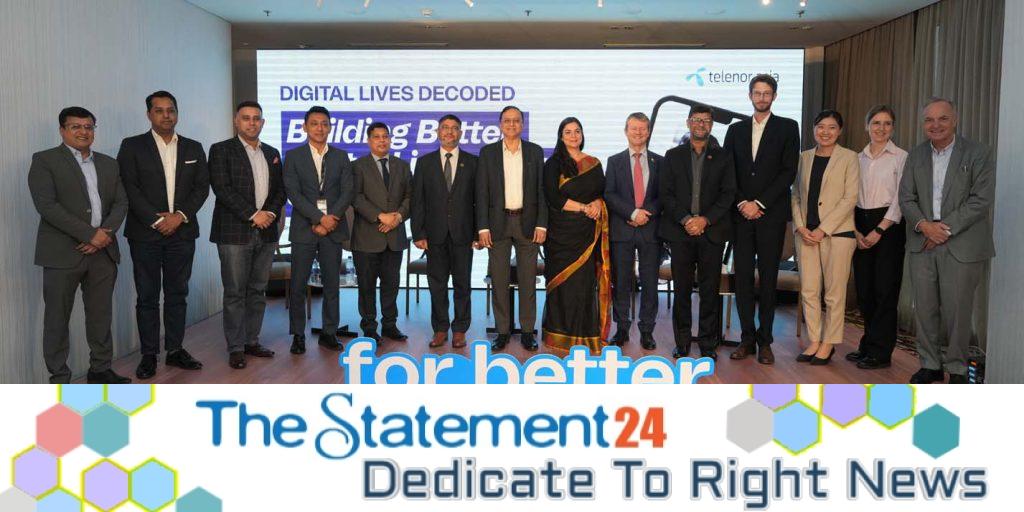
Telenor Asia, a leading telco-tech company in Asia and the main investor behind Grameenphone, today convened a diverse set of stakeholders including senior government officials, industry forerunners and media journalists for an industry event titled “Building Better Digital Lives for a Smart Bangladesh”.
Held at the Sheraton Dhaka International, the event commenced with an opening keynote from Chief Guest Md. Shamsul Arefin, Honourable Secretary of the ICTD Division. He shared the Government of Bangladesh’s Smart Bangladesh 2041 vision to transform the nation into an advanced, knowledge-based society. He also highlighted the power and potential of mobile connectivity to enable the vision.
“Digital infrastructure is fundamental to connectivity for millions in Bangladesh. Hence, our collective priority should be to leverage the tremendous power and potential of broadband to realise the vision of Smart Bangladesh 2041. Furthermore, we must work hard to ensure more people have the access and skills they need to harness ICT to transform their lives,” he said.
Manisha Dogra, Senior Vice President and Head of External Relations at Telenor Asia, then set the stage for a panel discussion with a presentation on Telenor Asia’s Digital Lives Decoded report, a survey of over 8000 people across 8 countries in Asia carrying strong evidence that mobile connectivity can transform societies, enhance productivity, and create new opportunities.
There followed a lively debate around the key policies and enabling factors needed to realise the Smart Bangladesh Vision 2041 between senior representatives from the ICTD Division, Bangladesh Telecommunications Regulatory Commission (BTRC) as well as industry leaders. Other key topics discussed included the need to promote public-private partnerships, developing a skilled cybersecurity workforce, and implementing strong cybersecurity policies and practices to safeguard critical infrastructure and sensitive information.
Closing the event with a speech, Special Guest Brigadier General Md. Ehsanul Kabir, Director General of the Engineering & Operations Division of the BTRC said, “We need to accelerate our joint efforts to address these concerns to further reduce the usage gap as mobile connectivity is one of the most important parts of a Smart Bangladesh. Together, we need to ensure a forward-looking and sustainable telecom infrastructure to facilitate Bangladesh’s digital transformation via meaningful connectivity.”
Dr Asif Naimur Rashid, Chief Business Officer of Grameenphone, added, “Grameenphone is intertwined with people’s lives, their daily challenges and socio-economic progress, supported by the power of connectivity. Our customers are our biggest priority, and we evolve to serve their growing needs and deliver a better experience. As our nation embarks on the journey to become Smart Bangladesh, Grameenphone strives to be a technology catalyst, to support hand in hand, ensuring that no one is left behind. We will continue to invest in our technology and capabilities to drive a digitally connected society. Grameenphone has been a partner in Bangladesh’s development journey for over two decades, and we see our role being strengthened in supporting the Smart Bangladesh vision and enabling a digitally connected society.”
Manisha Dogra, Head of External Relations at Telenor Asia, said, “From today’s discussion, it is evident that embracing the future of mobile connectivity is pivotal in bettering digital lives in Bangladesh. Our Digital Lives Decoded study highlights that mobile connectivity improves people’s quality of life, opens up economic opportunities and brings better access to essential services like education and health. Progressive policies that encourage innovation and adoption of new technology are crucial to furthering mobile adoption and strengthening a competitive and thriving digital economy in Bangladesh. We need to continue co-creating together, leveraging each other’s strengths and expertise to tap into future possibilities and achieve the potential of a Smart Bangladesh in a way that benefits all.”
Telenor Asia Digital Lives Decoded is a three-part report based on a study of over 8000 people across eight countries in Asia (Bangladesh, Indonesia, Malaysia, Pakistan, Philippines, Singapore, Thailand, Vietnam). The aim is to decode behaviours and attitudes towards mobile connectivity and how it is reshaping the way people in Asia live, work and play. Respondents were evenly split by gender, ranging in age from 18 years and older, and crossing four generations: Gen Z (Born 1997 – 2012); Millennials (Born 1981 – 1996); Gen X (Born 1965 – 1980); and Baby Boomers (Born 1946 – 1964).

